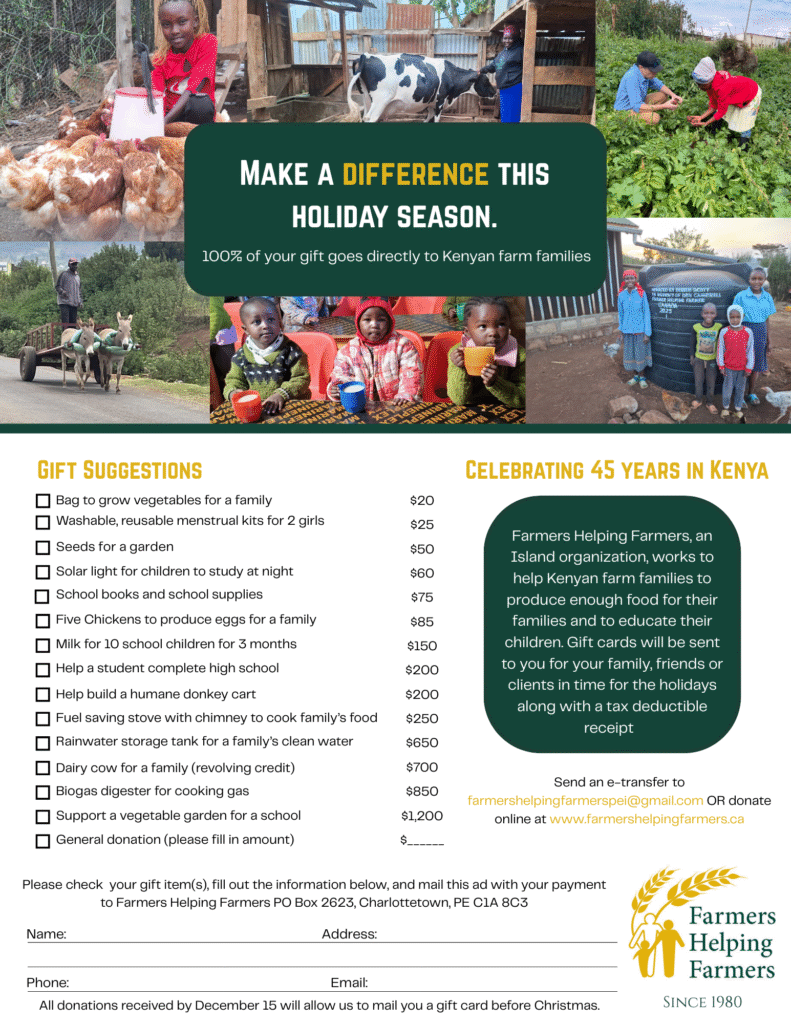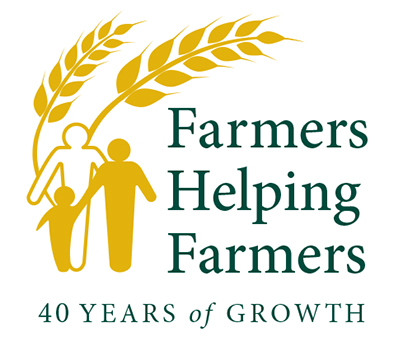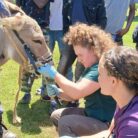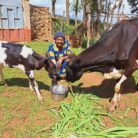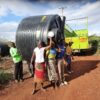The Farmers Helping Farmers Holiday Campaign has many ways to help make a difference for women, children and families in Kenya, as the P.E.I.-based non-profit organization marks its 45th year.
The Holiday Campaign has been a crucial fundraiser for many years, raising money to continue the group’s impactful work in Kenya, which has been ongoing since 1980. The campaign raises around $100,000 annually, thanks to generous donors.
Thousands of women, children, families and communities have benefited from FHF projects including food initiatives including milk for schools, vegetable seeds and chickens. Water tanks and school books have also been staple gifts available to donate.
A new gift this year helps to support girls staying in school. A $25 donation will provide washable, reusable menstrual kits for two girls.

This item in the Holiday Campaign builds on the success of a program in 2022 that provided female hygiene kits at two rural schools.
“Empowering women is one of the key goals that Farmers Helping Farmers looks forward to accomplishing with its projects,” said FHF coordinator Teresa Mellish. “Among the vital factors that contribute to the empowerment and well-being of girls and women globally is access to sanitary pads and menstrual hygiene.”
Read more about the importance of female hygiene kits: https://www.farmershelpingfarmers.ca/female-hygiene-kits-help-girls-stay-in-school-in-rural-kenya/
Another important donation, new last year, is a $200 school grant which will allow a student to finish high school. School can be expensive for many families, as they have to pay both for tuition and uniform fees.
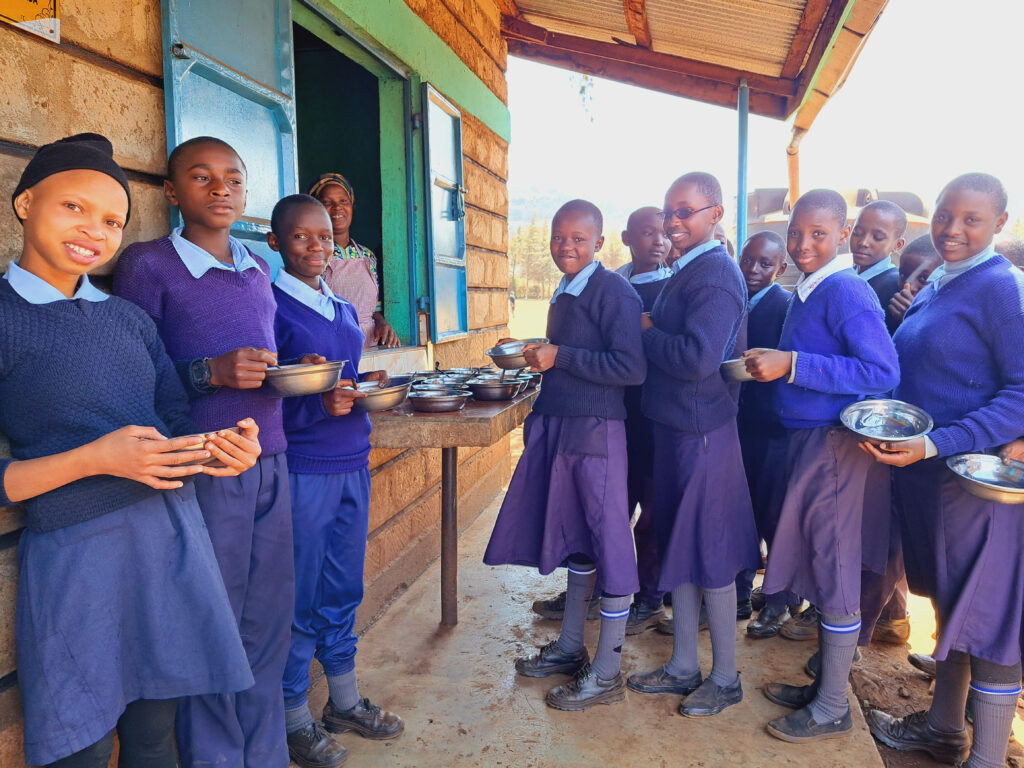
Another popular item in the Holiday Campaign is a $200 donation to help build a humane donkey cart.
Donkeys play an important role for many households and the economy. Donkeys in more arid areas are breeding females (known as Jennys), as well as pack animals for livestock and household water on a daily basis. In some places, male donkeys (known as Jacks) in teams of two, pull carts to haul firewood, market goods, milk and feed for cattle.
With the hilly terrain in so many areas, donkeys can move water and goods where even a motorbike would have difficulty. Their care is quite minimal, with donkeys mostly being tethered to graze for their feed.
READ MORE ABOUT The Donkey Project: https://www.farmershelpingfarmers.ca/donkey-welfare-in-meru/
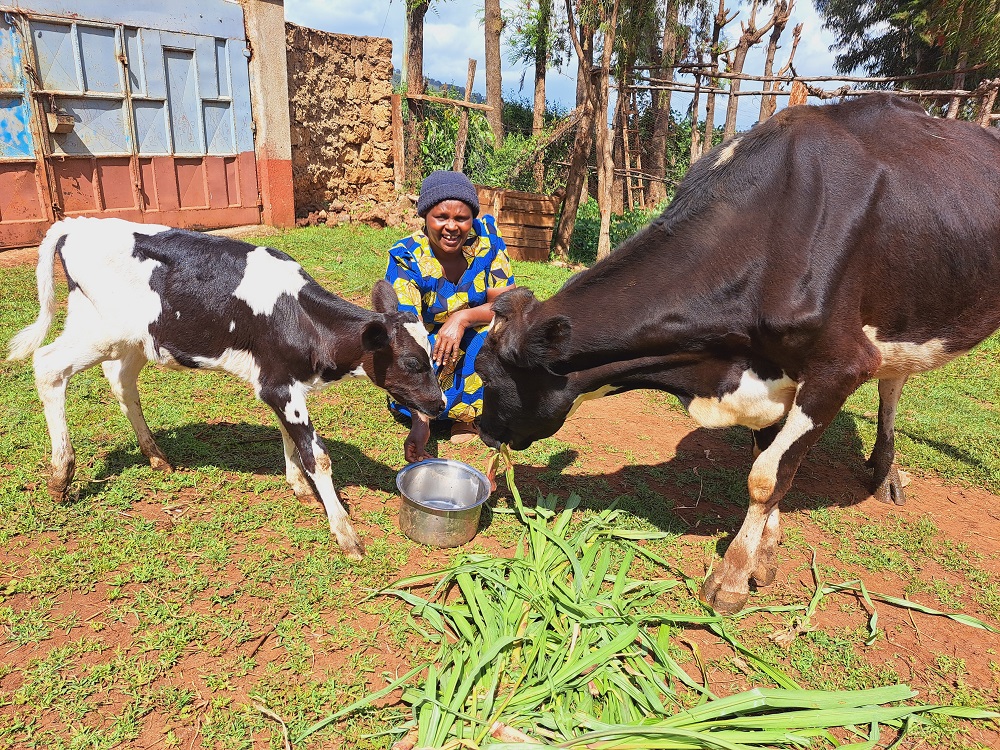
There is a wide range of gifts that donors can choose from, with all of them making a difference, from milk for school children, to a cow or chickens to produce food daily for a Kenyan farm family.
Here is the list of items for 2025:
$20 Bag to grow vegetables for a farm family
$25 Washable, reusable menstrual kits for 2 girls
$50 Seeds for a garden,
$60 Solar light for children to study at night
$75 School books and school supplies
$85 Five chickens to produce eggs for a family
$150 Milk for 10 school children for 3 months
$200 Help a student complete high school
$200 Help build a humane donkey cart
$250 Fuel saving stove with chimney to cook family’s food
$650 Rainwater storage tank for a family’s clean water
$700 Dairy cow for a family (revolving credit)
$850 Biogas digester for cooking gas
$1,200 Support a vegetable garden for a school
There is also the option of a general donation, which allows Farmers Helping Farmers to allocate the money to the project with the greatest need.
All of the gift items will make a significant difference.
There are many ways to donate to the Farmers Helping Farmers Holiday Campaign.
You can send an e-transfer to farmershelpingfarmerspei@gmail.com OR visit our FHF website and click on the DONATE button.
There is also a flyer available in the November and December editions of The Buzz if you prefer to mail us your donation.
All donations are eligible for a tax receipt and a holiday card of thanks will be mailed to you that you can share with family, friends or clients.
Donors will receive a card in time for Christmas for contributions received by December 15, 2025.
“Keep in mind that gifts such as vegetable seeds are not just a one time gift,” said FHF board member Ilse Peters-Ching. “As women grow vegetables for food, excess crops can be sold at markets which provide funds to keep children’s school fees paid. Seeds can be saved, providing seeds for the next crop. It truly is a gift that keeps on giving.”
